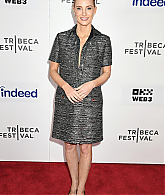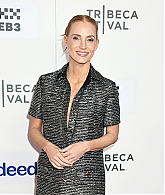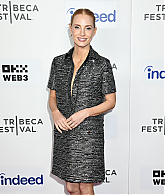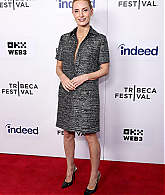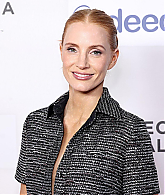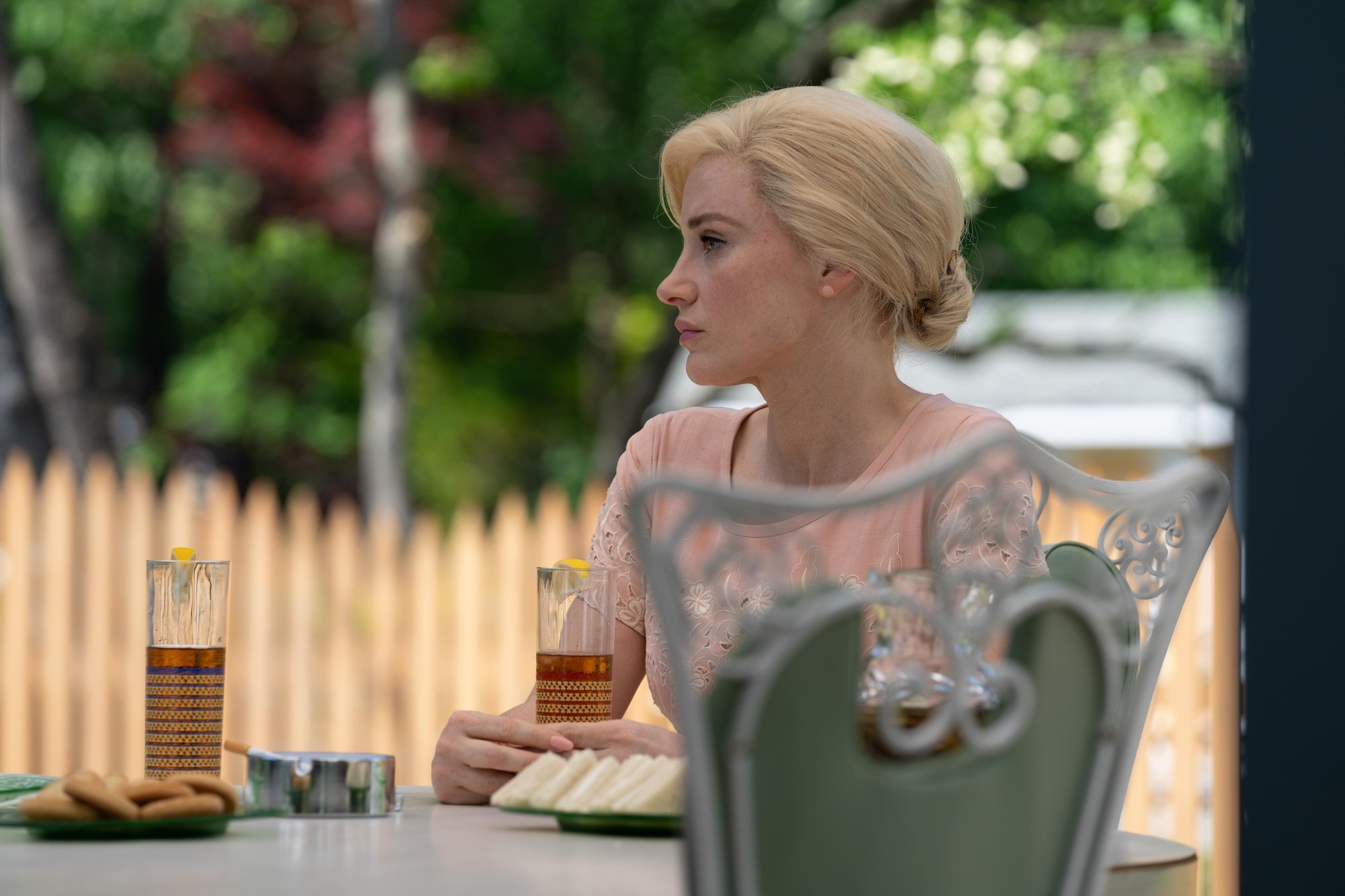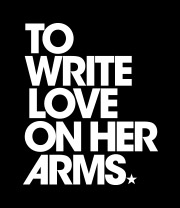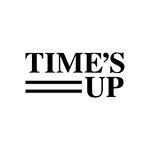 elcome to Jessica Chastain Network, your oldest and most complete resource dedicated to Jessica Chastain. You may better remember her as Molly Bloom in Molly's Game or Maya in Zero Dark Thiry. Academy Award winner for The Eyes of Tammy Faye, Jessica spans her career from big to small screen, seeing her not only in movies like The Help, The Debt, Miss Sloane, Woman Walks Ahead, The Zookeeper's Wife, The Good Nurse, she also played some iconic roles for series like Scenes from a Marriage and George & Tammy. Recently she registered a podcast series, The Space Within, and had a role in Memory and Mothers' Instinct. This site aims to keep you up-to-date with anything Mrs. Chastain with news, photos and videos. We are proudly PAPARAZZI FREE!
elcome to Jessica Chastain Network, your oldest and most complete resource dedicated to Jessica Chastain. You may better remember her as Molly Bloom in Molly's Game or Maya in Zero Dark Thiry. Academy Award winner for The Eyes of Tammy Faye, Jessica spans her career from big to small screen, seeing her not only in movies like The Help, The Debt, Miss Sloane, Woman Walks Ahead, The Zookeeper's Wife, The Good Nurse, she also played some iconic roles for series like Scenes from a Marriage and George & Tammy. Recently she registered a podcast series, The Space Within, and had a role in Memory and Mothers' Instinct. This site aims to keep you up-to-date with anything Mrs. Chastain with news, photos and videos. We are proudly PAPARAZZI FREE!

 elcome to Jessica Chastain Network, your oldest and most complete resource dedicated to Jessica Chastain. You may better remember her as Molly Bloom in Molly's Game or Maya in Zero Dark Thiry. Academy Award winner for The Eyes of Tammy Faye, Jessica spans her career from big to small screen, seeing her not only in movies like The Help, The Debt, Miss Sloane, Woman Walks Ahead, The Zookeeper's Wife, The Good Nurse, she also played some iconic roles for series like Scenes from a Marriage and George & Tammy. Recently she registered a podcast series, The Space Within, and had a role in Memory and Mothers' Instinct. This site aims to keep you up-to-date with anything Mrs. Chastain with news, photos and videos. We are proudly PAPARAZZI FREE!
elcome to Jessica Chastain Network, your oldest and most complete resource dedicated to Jessica Chastain. You may better remember her as Molly Bloom in Molly's Game or Maya in Zero Dark Thiry. Academy Award winner for The Eyes of Tammy Faye, Jessica spans her career from big to small screen, seeing her not only in movies like The Help, The Debt, Miss Sloane, Woman Walks Ahead, The Zookeeper's Wife, The Good Nurse, she also played some iconic roles for series like Scenes from a Marriage and George & Tammy. Recently she registered a podcast series, The Space Within, and had a role in Memory and Mothers' Instinct. This site aims to keep you up-to-date with anything Mrs. Chastain with news, photos and videos. We are proudly PAPARAZZI FREE!

 Entertainment Weekly released this week their annual Fall Movie Preview edition, and they have the first look of Jessica in Aaron Sorki’s debut Molly’s Game. The drama is based on the memoir Molly’s Game: From Hollywood’s Elite to Wall Street’s Billionaire Boys Club, My High-Stakes Adventure in the World of Underground Poker by Molly Bloom and sees Jessica Chastain leading the cast as Bloom alongside Idris Elba, Kevin Costner, Michael Cera, Brian d’Arcy James, and Chris O’Dowd.
Entertainment Weekly released this week their annual Fall Movie Preview edition, and they have the first look of Jessica in Aaron Sorki’s debut Molly’s Game. The drama is based on the memoir Molly’s Game: From Hollywood’s Elite to Wall Street’s Billionaire Boys Club, My High-Stakes Adventure in the World of Underground Poker by Molly Bloom and sees Jessica Chastain leading the cast as Bloom alongside Idris Elba, Kevin Costner, Michael Cera, Brian d’Arcy James, and Chris O’Dowd.
Molly Bloom a beautiful, young, Olympic-class skier who ran the world’s most exclusive high-stakes poker game for a decade before being arrested in the middle of the night by 17 FBI agents wielding automatic weapons. Her players included Hollywood royalty, sports stars, business titans and finally, unbeknownst to her, the Russian mob. Her only ally was her criminal defense lawyer Charlie Jaffey, who learned that there was much more to Molly than the tabloids led us to believe.”
 EW has published an interview with Jessica, ahead of the release of the magazine – which scan you can find now in our gallery.
EW has published an interview with Jessica, ahead of the release of the magazine – which scan you can find now in our gallery.
ENTERTAINMENT WEEKLY: We know the movie is about Molly Bloom, but not much else. What parts of the story does the film dive into? How much of her life does it depict?
JESSICA CHASTAIN: Basically, the film follows along with the book, but also a lot of very interesting things happened to Molly after the book came out, which includes being arrested by the FBI, and so [Aaron Sorkin] really has woven together the different parts of her life: her athletic and academic excellence, alongside with going to Los Angeles and trying to figure out what one has to become to be a leader and to find success — and all that is also woven with her court case.
What was it about Molly Bloom’s story that drew you to the role?
Well, the first thing that attracted to me was working with Aaron Sorkin. He’s a great hero of mine in terms of screenwriting, and you know, I’ve watched every episode of The West Wing multiple times. He’s such a prolific writer and also such a great mind in terms of talking about where we are in society and you know, the best of what we could be and the worst of what we could be. I’m very inspired by what he writes,
Then also what fascinated me about the character — and a lot of this from meeting Molly — is the idea of our modern society and what it means for a woman to find success. What does she have to become for men to allow her to be a leader? Because I think that this is a very interesting time for women in the United States to ask that question.
And Molly kind of goes into that rabbit hole of trying to become what she believes will give her access and the power to the elusive male dynamic, and for me, that was a very interesting character to play and journey to go on, and you see that a lot in the film. You see where she begins and where she ends and the journey of what that is.
So how would you describe Molly’s depiction in the movie? Is she an anti-hero? Should the audience you think will be rooting for?
I think the audience would definitely be rooting for Molly. In the first five minutes, I will say, the opening of the film, it’s so strong, and from the get-go, we are with her. We learn a lot about her. I don’t want to give too much away, but I think it’s an incredible introduction to the woman that she is, and she makes some bad decisions, but I think her bad decisions, we don’t discredit her, or we don’t abandon her because of it. We still root for her because she’s a person who takes responsibility for her decisions.
You met personally with Molly Bloom for the role. How’d that go? What did you learn about her?
I learned so much from Molly, and it makes me slightly uncomfortable to talk about because, as an actor, in a way, we’re like little detectives, you know? When we meet people, there’s the idea of, okay, Molly came to meet me. She knew I was going to play her. So there’s the idea of what she wants to present to me — what I see on the surface and how she wants to be portrayed. But then also I have to do my job and look under that and go, okay, I know how you want me to see you — but also, you know, let me in a little bit into this vulnerability or maybe into the ugly areas that you may feel uncomfortable for me to see, and I think any human being is like that. I know that I am with you guys. You know what I mean? Anyone who’s having a conversation with a writer, you go, okay, you’re going to write about me, and there is the sense of, like, this is how I want you to see me, but also, you’re also getting to know me and my vulnerabilities as well, because they can’t help but come through.
And so that’s what my job is as an actor, and that’s what I was doing with Molly. I really like her, and she hasn’t seen the film, so I do have some anxiety. I hope that she likes the film, and I hope that she feels good about how I played her.
And did you dive into the poker world as well for research?
Yeah, I met some people who do a lot of the underground poker games in New York, and I went to the game and talked to a lot of people that had known Molly in the past.
Well, what was really surprising to me was the amount of money people were betting — and it was just in someone’s apartment! I was blown away. I mean, in the beginning, they didn’t know necessarily that I was there as research. Of course, the person who brought me knew, and I sat there for hours just like as a fly on the wall watching them, you know, listening to what they were talking about, watching the games, seeing the girls that were there that would organize food for late-night snacks, and also give massages as the men were sitting around the table.
The girls that were there dressed very provocatively and very sexy, and it was like being in a man cave, you know? One of the players brought a girlfriend who was there, kind of as a support system for the game. It was fascinating to watch, and then as the game went on, at one point, I did feel like, okay, I should tell these people that I’m going to play Molly, because I wanted them to feel like I wasn’t invading them or to feel like I had betrayed them. And, actually, it was wonderful. Once they found out, it was great. They got to tell me about their experiences of being around her.
Was there anything that surprised you from that world or that culture?
Well, it’s very male dominated, but that’s not surprising. You know, there were no women there gambling. I’d read her book, so there wasn’t a lot to be surprised by. She kind of laid it out for me, but being there, you see that they were very nice gentlemen, and they were so calm with the money that they were losing. I was having anxiety, and I was trying to mask the anxiety of how much money was on the table. No matter how much you hear about it, it’s still shocking.
Beyond poker, what are some of the bigger themes in the film?
Oh my gosh, there’s so much. What a person’s name means, what their integrity means. What do we value women and men most for? Our society is structured where women are valued for their sexual attraction, and they’re given power because of that, and it really trains girls at a young age that that is what they must become like a sex object in order to be listened to, rather than a girl who’s celebrated for what she actually has to say. So, for me, this film explores that dynamic in terms of gender.
You mentioned the poker world being dominated by men, and of course, Hollywood itself is boy’s club. Did your experience in show business at all relate to Bloom’s experience in her world?
I can’t necessarily relate to it so much as an actress because I didn’t really start my career as a woman that was valued as… I wasn’t playing femme fatales or you know, the sexy girlfriend. Those were never the characters that I was playing. So in terms of the industry, I don’t relate to that idea of the woman’s value being on the way she looks, but I see all throughout my everyday life in terms of politics, in terms of what women are judged on or what people talk about in terms of women.
So much about women is about whether or not the woman is seductive, and with men, it’s always about what the man has to say. It’s not about the tone of his voice or, I don’t know, how much he smiles. So I see that dynamic. It’s glaring at me, that. What does it mean to be a good leader? Why do some men have to feel like they can possess a woman sexually before they allow that woman to have power? Not that they actually do possess her sexually, but the idea that they could.
Idris Elba is one of your costars in the film — how was your experience working with him?
Oh, he’s incredible. He’s such an incredible actor, a really funny person. He and I, we were in the same bunker together on this one because he only had 10 days of shooting total for his character. It was 45 pages of dialogue, and all of our scenes were done in 10 days. So we met, and then we just hit the ground running, and anytime we had a break, we were going over the scenes for the next day. I’d never ever done 45 pages of dialogue, of Aaron Sorkin-style dialogue in six days. I remember talking about how for Miss Sloane, I was like, can you believe that I did 27 pages of dialogue in one week? And I come to this film, and because of the way the schedule was laid out, I was shocked by the 45 pages. Like, we did, a quarter of the movie in the first week. So it feels like we’ve been to war together, and we’re closer from it.
How are your own poker skills? Have they improved since making this movie?
Well, I understand the terminology, and I understand the game, per se, but Molly Bloom never played poker, and she doesn’t believe in gambling. I think having been around so many gambling addicts, she realized it’s not a positive thing to really do in your life. At least it wasn’t for her. So when I read her book and I understood that about her, I realized I didn’t need to do research by playing poker, because Molly Bloom never played. So my skills are terrible.
Molly’s Game is set for release on November 22nd in the States and on December 26th in the UK.





